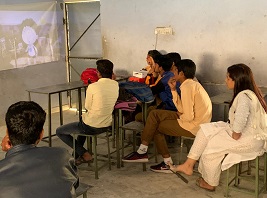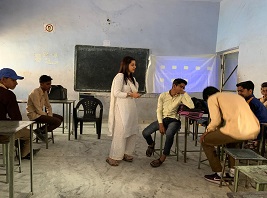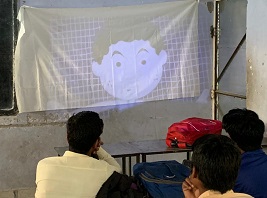A session on Child Labor was conducted at Shaheed Major Alok Mathur Senior Secondary School in Jhotwara, Jaipur, Rajasthan, in February 2020.
Child labor
Child labor is a global phenomenon. Its magnitude and dimensions, however, vary widely from country to country. India possesses the largest child labor force in the world despite various measures undertaken by the government and non-governmental agencies to tackle this issue. According to an estimate, there are over 60 million child laborers in India who constitute nearly 25 % of the working children of the world.
Child labor is the exploitation of underage children in many forms, forcing them to work illegally which harms or abuses them. This abuse may be physical, mental, or sexual; depriving the children (child laborers) of their right to basic education. According to the International Labor Organization(ILO), "child labor is where children are deprived of their childhood because they are forced to work long hours for little or no money, deprived of education and in conditions harmful to their mental and physical development.” It is present everywhere i.e. in developed, developing, and the underdeveloped worlds though ratios differ. Asia leads by 61% followed by Africa at 32%. According to UNICEF, there are 250 million children aged between 5-14 years employed as child labor in developing countries out of which 120 million work full time.
Among the developing countries, India has the highest number of child laborers under the age of 14 years which is approximately 12.6 million. Children are engaged in every sector of the economy like match stick making, fireworks, domestic labor, construction, carpet-making industry, brick kilns, etc.
The framers of the Indian Constitution incorporated relevant provisions under various articles in Part III and IV to ensure justice to children.
Selected articles of the Indian Constitution in this regard are presented as follows: Article-23: Prohibition of traffic in human beings and forced labor. Article-24: Prohibition of employment of children below the age of 14 years in factories, mines, or in any other hazardous employment. Article-45: Provision of early childhood care and education for children until the age of six years (86th Constitutional Amendment Act-2002). Article-21(A): Provision of free and compulsory education of children of the age of six to fourteen years (86th Constitutional Amendment Act, 2002). Article-51A (k): Fundamental duties of parent or guardian to provide opportunities for education of children between the age of six and fourteen years.
Activity conducted during the session






